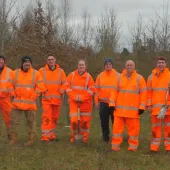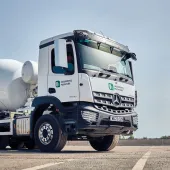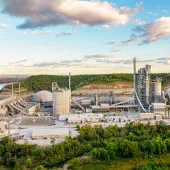Heidelberg Materials sign global agreement with Leilac

Companies working together to advance sustainable decarbonization of cement and lime
HEIDELBERG Materials have signed a global licence agreement with carbon capture technology specialists Leilac, as part of their continued expansion and use of carbon capture, use, and storage (CCUS) technologies.
Leilac’s patented technology is being developed to deliver a a highly efficient and low-cost carbon capture solution for unavoidable carbon process emissions in cement and lime production. The agreement is the result of a long-standing, close collaboration between the two partners, and a key milestone in the development and commercialization of Leilac’s CCUS technology.
‘Heidelberg Materials and Leilac have been successfully collaborating since 2014, further expanding our options to decarbonize the cement production process,’ said Dr Dominik von Achten, chairman of the managing board of Heidelberg Materials.
‘Now we can implement this groundbreaking technology at a larger scale. Adding it to our portfolio of carbon capture technologies, we will be even better positioned to make custom-fit technology decisions at each site. The licence agreement enables us to scale up Leilac’s technology at very good commercial terms based on a trusted partnership.’
Daniel Rennie, Leilac’s chief executive offer, added: ‘It forms the basis for the technology’s use throughout Heidelberg Materials, providing a model for the commercialization of the technology at global scale. Together, Leilac and Heidelberg Materials continue to de-risk, prove, and scale Leilac’s decarbonization technology.
‘The agreement is an important step in our journey towards providing cement and lime producers with access to a low-cost carbon abatement solution, allowing them to take urgent action against climate change and protect their industries’ jobs and prosperity.’
Heidelberg Materials are a founding and key member of a consortium of companies and institutions partnering to develop and apply the Leilac technology. Piloting CCUS technologies is a key element of Heidelberg Materials’ decarbonization strategy, and Leilac’s modular, scalable, and retrofittable technology will continue to be developed at various cement plants around the world.
Leilac1, located at Heidelberg Materials’ plant in Lixhe, Belgium, is a pilot facility supported by EU funding, with a capacity to capture 25,000 tonnes of CO2 per annum. The follow-up project Leilac2, also EU funded and due to commence in 2023, will be located at Heidelberg Materials’ plant in Hanover, Germany, with an estimated capture capacity of 100,000 tonnes of CO2 annually.
Both projects are expected to pave the way for future full-scale deployment of Leilac CCUS technology.









